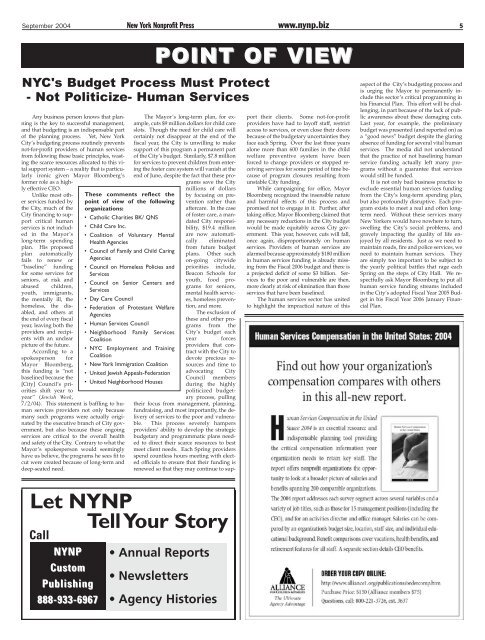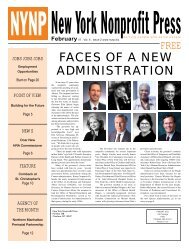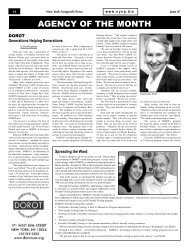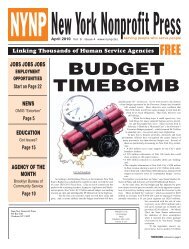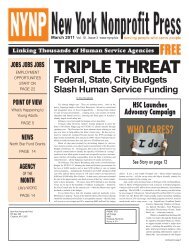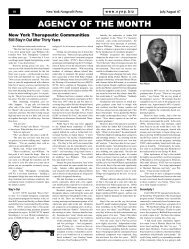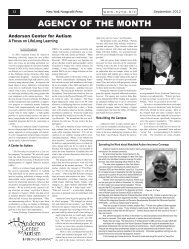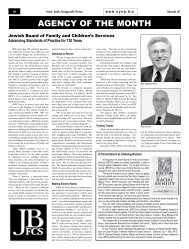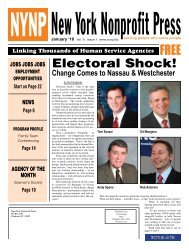September Edition 2004 - New York Nonprofit Press
September Edition 2004 - New York Nonprofit Press
September Edition 2004 - New York Nonprofit Press
You also want an ePaper? Increase the reach of your titles
YUMPU automatically turns print PDFs into web optimized ePapers that Google loves.
<strong>September</strong> <strong>2004</strong> <strong>New</strong> <strong>York</strong> <strong>Nonprofit</strong> <strong>Press</strong> www.nynp.biz 5<br />
Any business person knows that planning<br />
is the key to successful management,<br />
and that budgeting is an indispensable part<br />
of the planning process. Yet, <strong>New</strong> <strong>York</strong><br />
City’s budgeting process routinely prevents<br />
not-for-profit providers of human services<br />
from following these basic principles, wasting<br />
the scarce resources allocated to this vital<br />
support system – a reality that is particularly<br />
ironic given Mayor Bloomberg’s<br />
former role as a highly<br />
effective CEO.<br />
Unlike most other<br />
services funded by<br />
the City, much of the<br />
City financing to support<br />
critical human<br />
services is not included<br />
in the Mayor’s<br />
long-term spending<br />
plan. His proposed<br />
plan automatically<br />
fails to renew or<br />
“baseline” funding<br />
for some services for<br />
seniors, at risk and<br />
abused children,<br />
youth, immigrants,<br />
the mentally ill, the<br />
homeless, the disabled,<br />
and others at<br />
the end of every fiscal<br />
year, leaving both the<br />
providers and recipients<br />
with an unclear<br />
picture of the future.<br />
According to a<br />
spokesperson for<br />
Mayor Bloomberg,<br />
this funding is “not<br />
baselined because the<br />
[City] Council’s priorities<br />
shift year to<br />
year” (Jewish Week,<br />
7/2/04). This statement is baffling to human<br />
services providers not only because<br />
many such programs were actually originated<br />
by the executive branch of City government,<br />
but also because these ongoing<br />
services are critical to the overall health<br />
and safety of the City. Contrary to what the<br />
Mayor’s spokesperson would seemingly<br />
have us believe, the programs he sees fit to<br />
cut were created because of long-term and<br />
deep-seated need.<br />
POINT OF VIEW<br />
NYC's Budget Process Must Protect<br />
- Not Politicize- Human Services<br />
These comments reflect the<br />
point of view of the following<br />
organizations:<br />
• Catholic Charities BK/ QNS<br />
• Child Care Inc.<br />
• Coalition of Voluntary Mental<br />
Health Agencies<br />
• Council of Family and Child Caring<br />
Agencies<br />
• Council on Homeless Policies and<br />
Services<br />
• Council on Senior Centers and<br />
Services<br />
• Day Care Council<br />
• Federation of Protestant Welfare<br />
Agencies<br />
• Human Services Council<br />
• Neighborhood Family Services<br />
Coalition<br />
• NYC Employment and Training<br />
Coalition<br />
• <strong>New</strong> <strong>York</strong> Immigration Coalition<br />
• United Jewish Appeals-Federation<br />
• United Neighborhood Houses<br />
The Mayor’s long-term plan, for example,<br />
cuts $9 million dollars for child care<br />
slots. Though the need for child care will<br />
certainly not disappear at the end of the<br />
fiscal year, the City is unwilling to make<br />
support of this program a permanent part<br />
of the City’s budget. Similarly, $7.8 million<br />
for services to prevent children from entering<br />
the foster care system will vanish at the<br />
end of June, despite the fact that these programs<br />
save the City<br />
millions of dollars<br />
by focusing on prevention<br />
rather than<br />
aftercare. In the case<br />
of foster care, a mandated<br />
City responsibility,<br />
$19.4 million<br />
are now automatically<br />
eliminated<br />
from future budget<br />
plans. Other such<br />
on-going citywide<br />
priorities include,<br />
Beacon Schools for<br />
youth, food programs<br />
for seniors,<br />
mental health services,<br />
homeless prevention,<br />
and more.<br />
The exclusion of<br />
these and other programs<br />
from the<br />
City’s budget each<br />
year forces<br />
providers that contract<br />
with the City to<br />
devote precious resources<br />
and time to<br />
advocating City<br />
Council members<br />
during the highly<br />
politicized budgetary<br />
process, pulling<br />
their focus from management, planning,<br />
fundraising, and most importantly, the delivery<br />
of services to the poor and vulnera-<br />
port their clients. Some not-for-profit<br />
providers have had to layoff staff, restrict<br />
access to services, or even close their doors<br />
because of the budgetary uncertainties they<br />
face each Spring. Over the last three years<br />
alone more than 600 families in the child<br />
welfare preventive system have been<br />
forced to change providers or stopped receiving<br />
services for some period of time because<br />
of program closures resulting from<br />
unstable City funding.<br />
While campaigning for office, Mayor<br />
Bloomberg recognized the insensible nature<br />
and harmful effects of this process and<br />
promised not to engage in it. Further, after<br />
taking office, Mayor Bloomberg claimed that<br />
any necessary reductions in the City budget<br />
would be made equitably across City government.<br />
This year, however, cuts will fall,<br />
once again, disproportionately on human<br />
services. Providers of human services are<br />
alarmed because approximately $180 million<br />
in human services funding is already missing<br />
from the Fiscal 2006 budget and there is<br />
a projected deficit of some $3 billion. Services<br />
to the poor and vulnerable are then,<br />
more clearly at risk of elimination than those<br />
services that have been baselined.<br />
The human services sector has united<br />
to highlight the impractical nature of this<br />
ble. This process severely hampers<br />
providers’ ability to develop the strategic<br />
budgetary and programmatic plans needed<br />
to direct their scarce resources to best<br />
meet client needs. Each Spring providers<br />
spend countless hours meeting with elected<br />
officials to ensure that their funding is<br />
renewed so that they may continue to supaspect<br />
of the City’s budgeting process and<br />
is urging the Mayor to permanently include<br />
this sector’s critical programming in<br />
his Financial Plan. This effort will be challenging,<br />
in part because of the lack of public<br />
awareness about these damaging cuts.<br />
Last year, for example, the preliminary<br />
budget was presented (and reported on) as<br />
a “good news” budget despite the glaring<br />
absence of funding for several vital human<br />
services. The media did not understand<br />
that the practice of not baselining human<br />
service funding actually left many programs<br />
without a guarantee that services<br />
would still be funded.<br />
It is not only bad business practice to<br />
exclude essential human services funding<br />
from the City’s long-term spending plan,<br />
but also profoundly disruptive. Each program<br />
exists to meet a real and often longterm<br />
need. Without these services many<br />
<strong>New</strong> <strong>York</strong>ers would have nowhere to turn,<br />
swelling the City’s social problems, and<br />
gravely impacting the quality of life enjoyed<br />
by all residents. Just as we need to<br />
maintain roads, fire and police services, we<br />
need to maintain human services. They<br />
are simply too important to be subject to<br />
the yearly political battles that rage each<br />
Spring on the steps of City Hall. We respectfully<br />
ask Mayor Bloomberg to put all<br />
human service funding streams included<br />
in the City’s adopted Fiscal Year 2005 Budget<br />
in his Fiscal Year 2006 January Financial<br />
Plan.<br />
Let NYNP<br />
Tell Your Story<br />
Call<br />
NYNP<br />
Custom<br />
Publishing<br />
888-933-6967<br />
• Annual Reports<br />
• <strong>New</strong>sletters<br />
• Agency Histories


